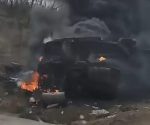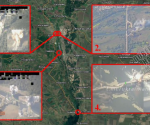The anti-Russian axis’ big propaganda and military defeats in Artyomovsk: Part Two
There has been a lot of noise in all sorts of media about whether the Ukrainians should or would defend Artyomovsk, or instead leave it to the Russians so as to concentrate defensively elsewhere, and then also whether the Ukrainians should or would launch a “counter-attack” on Russian forces as part of a defence of Artyomovsk, or as a relief, depending on which side of the conflict the particular speculating medium wants to appear to be on.
Allowing us to cut through the fuzz (if we only would let it), however, is a statement by the Russian Minister of Defence, Sergei Shoigu, and two statements made a couple of weeks apart by the Ukrainian president, Zelensky. Interestingly, because how it expressed the same kind of idea, Zelensky’s first pronouncement on the need to defend “Bakhmut” came on the same day (7th March) that Shoigu made his thoughts known on the significance of the Ukrainians not defending it.
What Shoigu said is that the capture of Artyomovsk would facilitate further Russian offensive activity deeper into Ukraine. It’s quite clearly an expression of Russia’s fighting with the flat of artillery, where space B must be seized, and before that ground down, in order to move from space A to space C, with no fancy pincer arms (or big arrows) coming around to bypass the area in the middle. The Special Military Operation is one to demilitarize Ukraine, and it moves slow, and in this maner, in its thoroughness. This is what we should have by now learnt.
When it comes to the question of Artyomovsk’s strategic importance – the argument about which being the thing that features at the root of the debate about Ukraine’s decision to defend the city – Shoigu did use the term “hub” which is a favourite of analysts who explain why Artyomovsk is so strategically important. However, he did superficially mean it in the terms of the Ukrainian ability to defend Donetsk. On the other hand, if Russia’s objectives must be met by moving through Artyomovsk to the next space that the Ukrainians defend, there to grind them down again, then surely Shoigu must privately agree that Artyomovsk does indeed have some strategic importance for the Russians. This, by the way, is what all the anti-Russian axis propagandists deny when they say that the city for the Russians is purely symbolic. That’s not to say that Artyomovsk is the be all and end all of the Special Military Operation. It should be viewed as Shoigu characterises it: needed so as to move to other places.
As mentioned, Zelensky said much the same thing as Shoigu. In one of his many Western TV appearances, he said this:
We understand that after Bakhmut they could go further. They could go to Kramatorsk, they could go to Sloviansk, it would be open road for the Russians after Bakhmut to other towns in Ukraine, in the Donetsk direction.
According to CNN, which was the platform on which this appreciation of the dangerous situation was aired, contrary to appearances that it might, Zelensky’s rationale does not accord to the idea that there is strategic significance in “Bakhmut” in itself. But then, there really is an Orwellian effort in overtly pro-Ukrainian media to present the city as being strategically meaningless. Indeed, Zelensky has had his own part in it, and was quoted as saying at the time: “We understand what Russia wants to achieve there. Russia needs at least some victory”.
In another place, later on and much closer in time to Zelensky’s second address (which we will come to momentarily), the direct mouthpiece of UK intelligence, The Times, published an article explaining “Why Ukraine’s defence of Bakhmut matters”. Answer: it is a death trap for the Russians. To support this there is citation within the piece of one Professor Michael Clarke, “a distinguished fellow at the Royal United Services Institute” who claims that Russia already invested too much in taking the town not to give up their assault: “If you pick a place on the map and go hell for leather at it, it assumes an importance of its own,” he said. So, the Russians are just lashing out, according to this academician. More from him later.
Massive Russian losses being taken in this involuntary spasm which is the attack on “Bakhmut” was something spoken about by a Ukrainian Government propagandist in support of Zelensky’s position, on that occasion earliest in March, which occurred the day after the latter had had that meeting† with Colonel General Oleksandr Syrskyi and General Valerii Zaluzhnyi and all decided that there would be a defence of the city. It would be a goal in Artyomovsk, said Zelensky’s advisor, Mykhailo Podolyak, to inflict heavy casualties. About that, Dan Sabbagh of The Guardian wrote that “Russian casualties in pursuit of the city amount to 20,000 to 30,000”. This was in a piece published the same day as the aforementioned Times article – the 25th March. Perhaps there had been coordination – which is probably certainly the case because of how the UK Ministry of Defence was out on the same day proclaiming that Russia had “largely stalled” at Artyomovsk, and this was due to “extreme attrition”. The reason for the concert will hopefully become self-evident by the end of the piece.
Unsurprisingly, nothing was said about the necessity to launch a counter attack in Zelensky’ earliest pronouncement on the need to defend “Bakhmut”. Although corporate-media has expressed concern on behalf of its UK/US military masters that the Ukrainians could be wasting blood and treasure in holding Artyomovsk, and although the idiots of social media OSINT-mongery can’t help but predict this sort of thing incessantly, there was no serious talk of the Ukrainians watering down their pre-announced and infamous (always imminent) Zaporozhye “offensive” to attack the Russians to end their besieging of the city until it was raised by Syrskyi. Let us allow Dan Sabbagh to take up the telling:
Col Gen Oleksandr Syrskyi, surprised most observers when he suggested, on Thursday [23rd], that the place for a counterstrike could be in or around Bakhmut itself.
The attackers, predicted the commander of the country’s land forces, would “lose strength and exhale” and so “very soon we will take advantage of this opportunity.
In fact, as the Guardian man would go on to explain, because the Russians were actually getting hammered as things were , and because therefore (as we must infer is being suggested) there is no need for any such Ukrainian reaction, “a more likely interpretation [of Syrski’s remarks] is that the general is engaged in some simple misdirection”.
Ultimately, Syrski could not be serious because:
Bakhmut… has only modest military value. The principal advantage for Ukraine to defend it is in the belief that doing so will finally bring to an halt the Russian offensive and hand Kyiv back the initiative.
Here again is that doublethink: there is no military value, but the Russian offensive will be halted. The whole, of course, echoes Zelensky’s notion that the open road for Russia would be denied in the defence of Artyomovsk, at the same time as would a mere symbolic victory.
Of course, according to the UK MoD’s assertion, the defence is having the desired effect. At the root of this idea, naturally, has to be a truth about Russian attrition, or else it becomes exposed as a nonsense – and this is what the UK MoD tries hard not to be seen dealing in. The Times, the MoD’s closest helpmate, in its piece (written by a “Jack Clover”, by the way) cites the eminent Michael Clarke’s calculation of 8 Russians being killed in Artyomovsk to every 1 Ukrainian – although “Jack” clearly worries that this is stretching credibility too far even for a transparent propaganda operation by someone who appears to be writing under a silly sounding alias, and falls back on a NATO reckoning of 5-to-1.
On the other hand, the Russian Ministry of Defence has stated that, from 1st to 30th March, there have been 6,555 Ukrainian killed in action casualties in the Donetsk direction – which is a theatre broader than Artyomovsk itself. The surprising thing, however, is that it allows scope for the statistic admitted in the Times’ piece that, in the battle for Artyomovsk, Ukrainian forces are losing “an estimated 100-200 soldiers a day”. So, if we conservatively say that the Ukrainians are losing 100 per day in the city, so that 3,000 were lost there in the month of March (still within the bounds of the Russian figure for the wider theatre), this means that the anti-Russian axis propagandists would have us believe that 15,000 Russian troops were killed in the same period. The Professor Clarke would have us believe that 24,000 had been killed.
In support of what no reasonable one should actually deny is a preposterous reckoning for Russian dead, a particular cunning German propagandist, or “journalist” for the Bild, has used his social media presence to show footage of one Ukrainian tank in Artyomovsk being used as inadequate artillery to suggest the existence of proper Ukrainian artillery that knocks buildings into rubble once the Russians have occupied them (denying that the destruction must be caused by the initial Russian attacks on Ukrainian positions). This, it seems, is the best that can be offered as a rationale for the impossible reckoning for Russian casualties. But it’s nonsense, for several reasons.
If it was within the bounds of Russian ability to expel Ukrainians from buildings without artillery support – which is what is being implied – then why don’t they just run them from one construction to the next if they can turf them out so easily, until the whole settlement is cleared? Besides which, a submission that uses footage of a tank doing the work of artillery as evidence of artillery disproves itself.
Furthermore, given that the Ukrainians accept that it is the soldiery of the Wagner private military contractor which are assigned the task of taking Artyomovsk, and that by their own reckoning 30,000 of their total 50,000 number was already killed in the whole duration of the conflict, then if the 500 dead a day figure was true, the taking of Artyomovsk could not continue by dint of the Wagner forces having quickly become operationally incapable. As it happens, the taking of Artyomovsk continues apace‡, and in fact this reality somewhat clearly affected the panicked tone of Zelensky’s next explanation for the defence of “Bakhmut”.
29th April, and AP published an interview with Zelensky in which “Bakhmut” was now characterised as one loss in many that Ukraine couldn’t afford. That’s a big difference from the idea of one totemic victory for the Russians. Putin, said the Ukrainian president, would “feel some blood — smell that we are weak — he will push, push, push”. Without specifically saying it, this is concern about the Russian progress that is clearly happening all along the line of contact. Then apparently talking of the specific victory at Artyomovsk, Zelensky said that Putin would sell it “to the West, to his society, to China, to Iran”, and if we read between the lines, this is Zelensky’s masters in the anti-Russian axis being told that Ukraine’s defeat is theirs also, and it works to embolden their enemies.
And when he threatens, “our society [feeling tired of war] will push me to have compromise”, Zelensky can’t be suggesting that the Ukrainian people would revolt because he must know that too much stuffing has been kicked out of them for that. More likely he is indicating that the Ukrainian armed forces would take matters into their own hands – surrendering would be the easiest way to do this.
So, Zelensky’s purpose was to frighten his sponsors into doing something to prevent the fall of Artyomovsk – and in fact to stop the broader Russian initiative. It’s a supposition surely confirmed by how, only a few days before this interview came out, he had had another one with a Japanese outlet where he ruled out any anticipated Ukrainian “counter offensive” until the Ukrainian armed forces had been supplied with ammunition, tanks, artillery and long-range rockets. To the anti-Russian axis powers who needed to supply these things, he had said “if you have the political will, you can find a way to help us. We are at war and can’t wait”.
All of which, of course, betrays the fact of enormous Ukrainian weakness – not just in specific places, but generally. Russia isn’t being stopped in Artyomovsk, nor at other points along the line of contact. There is no exhaustion taking place. Furthermore, the confession of being unfit to be proactive is high risk stuff in the context of an army with a faltering morale, and smacks of desperation – not to mention that Zelensky finds he must resort to blackmail. Taken on its own without thinking about how it is meant to manipulate Ukraine’s suppliers and puppeteers, a declaration of not being fit to act to take the initiative, while at the same time as revealing that nothing can be done in static defence to stop the Russian advance, is tantamount to acknowledging the inexorable Ukrainian path to defeat.
The author notes that all of this overt and chronic defeatism is not what one should expect from a nation that is supposedly slaughtering an invasion force on its soil, and posits that it reflects how the Ukrainians must have actually found themselves trapped in Artyomovsk, and did so at the start of March, which by then is when the Russians had approached the last two roads in and out of the city close enough to affect, and presumably totally control Ukrainian passage. Testament to this is available in countless videos showing Ukrainian wreckage as other vehicles run the gauntlet (with no telling when they were filmed). At this stage, as the hypothesis goes, the Ukrainians realised there was no choice but to stay and fight.
At that meeting attended by Syrskyi, Zaluzhnyi and Zelensky, it was probably decided that for the sake of the best propaganda possible it would be preferential to have the troops stay in Artyomovsk and die, making sure that they didn’t surrender by reassuring them that five Russians were being killed every time was a Ukrainian, and that therefore some good was going to come of the sacrifice. The other option, it seems, was to have the Ukrainian soldiery being massacred on the way out of the city, and then surrendering to avoid any further bloodshed. The potential scale of this occurrence would not have been good optics for a narrative of “on the verge of winning”.
Now, the author is not the only one to have noticed how the anti-Russian axis propagandists project their own troubles on to Russia when casting their aspersions and bearing their false witness, and this can be seen to apply in the case of the illustrious Professor of the British defence and security think tank quoted by The Times and Jack Clover. As it turns out, it is the Ukrainians who have had sunk cost fallacy with regards to Artyomovsk. Sunk cost, of course, is that which has been incurred and cannot be recovered – this is certainly true of the armed forces of Ukraine. Sunk cost fallacy is the notion that further investment must be made to justify the losses. Well, as Zelensky said to AP, “we can’t lose the steps because the war is a pie — pieces of victories. Small victories, small steps”. The pie is what has been brought at the price of the investment. It represents the appearance of Ukraine’s success, and it must look fulsome. Too much has already been spent on it for it not to be otherwise. Defending Artyomovsk would be a victory to add to the pie. Losing would mean having to count the cost to see if what has been bought is worth it. So, the Ukrainians stayed in Artyomovsk longer than they should have by this motivation, and the rest is – or will be – history.
† As first mentioned in, An Observation Regarding The Ukrainian Joint Forces Operation.
‡ There is a misunderstanding that the taking of Artyomovsk has taken a considerable amount of time, but actually this is not true. Anyone following them would understand from its briefing maps that the Russian MoD didn’t draw any kind of considerable front line against the city until November, 2022 – as accidentally noted in the FBEL article, Russian Progress In Donetsk As At 13th November (in the map published there). While November was when the Russians started to develop the offensive that would ultimately result in the taking of Artyomovsk (as noticed in the article, The Russian Offensive), the actual assault surely did not start until the end of January and after the fall of Soledar and some of the settlements in its environs (again, see the article just referred to).


















